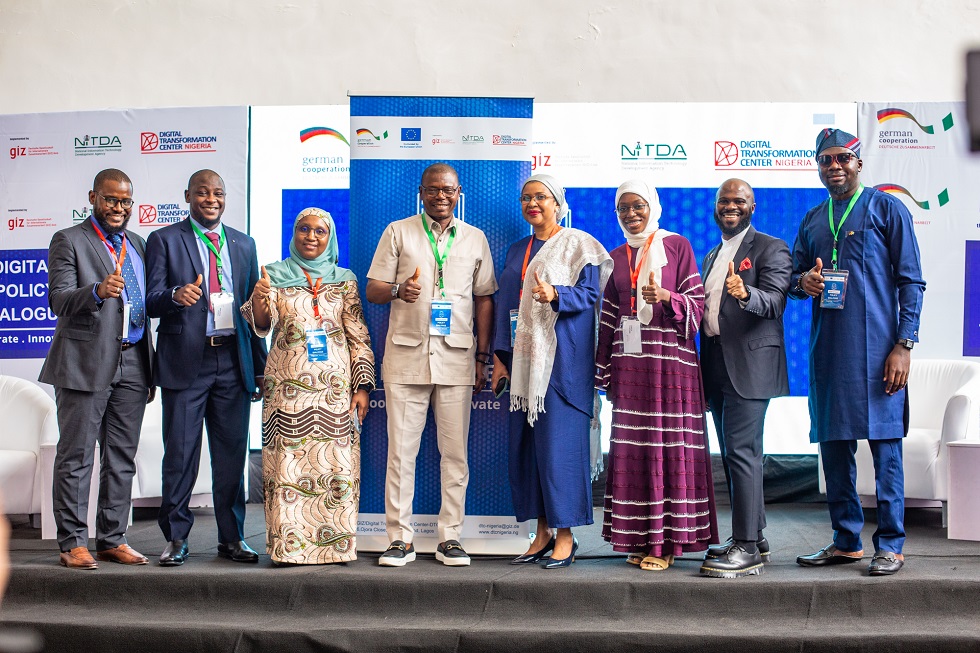The GIZ/Digital Transformation Center (DTC), in partnership with the European Union and the National Information Technology Development Agency (NITDA), organised a digital policy dialogue session with the Nigerian Startup Act (NSA) in focus.
DTC Nigeria aims to foster inclusive discussions and gather valuable insights from stakeholders to create an effective framework that promotes innovation, entrepreneurship, and sustainable economic growth within the Nigerian startup ecosystem and digital economy.
The productive session, which was held in Lagos on Thursday, July 27, 2023, brought stakeholders from the public and private sectors together in one room to discuss ways to foster the adoption of the Nigeria Startup Act nationwide.
Present at the policy dialogue was Dr. Thuweba Diwani, Head, GIZ/Digital Transformation Center (DTC) Nigeria, who delivered the welcome address. She said the Nigerian startup will not only create an enabling environment but also increase capacity building and accelerate development. That’s why it’s important for stakeholders to work together to ensure the success of the Startup Act.

The session also had addresses from Markus Wauschkuhn, Sustainable Economic Development Cluster (SEDEC) coordinator, GIZ Nigeria, and Inga Stefanowicz, Head of Section, Green and Digital Economy, EU Delegation to Nigeria and the ECOWAS.
Dr. Aminu Lawal Muhammad, Special Adviser to the Director General of NITDA on digital transformation, spoke extensively on the Nigeria Startup Act and its effects on digital transformation in Nigeria. He discussed the work that has been done, adding that continuous work and support will continue to come from NITDA.
Tracy Okoro-Isaac, State Adoption Lead for the Nigeria Startup Act, took the audience through the journey that led to the Nigeria Startup Act, from the call for volunteers to the continuous pushing of boundaries and accomplishment of milestones upon milestones leading up to the signing of the act.
She summarised some of the provisions of the act, adding that it was designed to greatly benefit startups and that the government is actively supporting them given that the act holds all stakeholders accountable.
A panel session moderated by Justina Oha, Founder and CEO, Digital Equity Africa, with panellists Amina Lawal, DevOps Engineer, Hostspace; Ized Uanikhehi, Founder, Zedi Africa; Engineer Yakubu Musa, Acting National Coordinator, ONDI NITDA; Amal Hassan, Co-vice chair of the implementation committee; Charles Emembolu, co-founder and director, Roar Nigeria Hub; and Amina Lawal, DevOps Engineer and Co-founder, Hostspace, took a deep dive into the impact of the Nigeria Startup Act on the innovation-driven economy.
Amal discussed some of the benefits of the act given that it protects startup founders and provides them with the kind of support older businesses would have loved to have when they started out, using her early business venture as an example.
Amina was able to point out the need for continuous training and the provision of jobs for the trained individuals. She also called for the need to create an enabling environment and provide the necessary infrastructure for tech-enabled businesses to thrive.
Musa, speaking from NITDA’s position, said that they are working with state governments to get them to implement the Nigerian Startup Act in their respective digital transformation plans. He said they are working to get the states to create their own startup acts, using the national startup act as a blueprint.
Ized called for increased participation in local communities where all stakeholders are present and the government increases engagement and continues to build trust.
The panellists and the audience agreed that all the stakeholders in the act need to meet each other fully because each citizen has a stake in the act, citing that the government cannot do it alone. So the success of the act will depend on the continuous collaboration of all stakeholders.
Charles called for more local investment and the creation of an enabling environment to incentivize local investors to invest in local startups.
Ized also called for the government to ensure that startups are protected from new policies that may contradict the Nigeria Startup Act.

Oswald Guobadia, Nigeria Startup Implementation Committee Lead, contributed to the conversation, saying that responsibility lies on the desk of NITDA to increase state adoption of the Startup Act given that it’s their responsibility according to the provisions of the act.
As the event was drawing to a close, a focus group discussion was held. The participants were broken into four groups with the aim of gathering insights for the development of a participatory policy implementation framework. Each group focused on development processes, stakeholders, capacity building, policy implementation, technology as an enabler, and monitoring and evaluation of the startup act, respectively.
Each group presented their solutions, which were deliberated upon during the discussion, with NITDA taking note of the feedback.
The dialogue came to a close with more calls for capacity building, effective feedback mechanisms, more engagement between public and private sector stakeholders, and increased awareness and education on the provisions of the Nigerian Startup Act.
About GIZ/DTC Nigeria:
GIZ/Digital Transformation Center (DTC) Nigeria is jointly funded by the European Union and the German Federal Ministry for Economic Cooperation and Development (BMZ), and it is implemented by Deutsche Gesellschaft fuer Internationale Zusammenarbeit (GIZ) GmbH.
DTC Nigeria aims to improve the capacities of the digital innovation ecosystem—policy implementation, performance of organisations, and networks as service providers for the digital economy, offering scalable digital solutions and competencies—for the growth of the digital innovation ecosystem. The project works closely with Nigerian actors in the innovation ecosystem, such as the National Information and Technology Development Agency (NITDA), research institutions, innovation hubs, hub networks, startups, MSMEs, and women.





